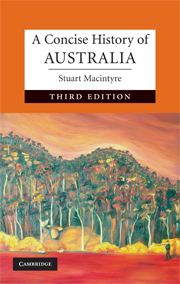Book contents
- Frontmatter
- Contents
- List of illustrations
- Acknowledgements
- Map 1.1 Australia: the main rivers, cities and towns
- 1 Beginnings
- 2 Newcomers, c. 1600–1792
- 3 Coercion, 1793–1821
- 4 Emancipation, 1822–1850
- 5 In thrall to progress, 1851–1888
- 6 National reconstruction, 1889–1913
- 7 Sacrifice, 1914–1945
- 8 Golden age, 1946–1974
- 9 Reinventing Australia, 1975–2008
- 10 What next?
- Sources of quotations
- Guide to further reading
- Index
4 - Emancipation, 1822–1850
- Frontmatter
- Contents
- List of illustrations
- Acknowledgements
- Map 1.1 Australia: the main rivers, cities and towns
- 1 Beginnings
- 2 Newcomers, c. 1600–1792
- 3 Coercion, 1793–1821
- 4 Emancipation, 1822–1850
- 5 In thrall to progress, 1851–1888
- 6 National reconstruction, 1889–1913
- 7 Sacrifice, 1914–1945
- 8 Golden age, 1946–1974
- 9 Reinventing Australia, 1975–2008
- 10 What next?
- Sources of quotations
- Guide to further reading
- Index
Summary
Within a month of landing at Sydney, John Bigge was in dispute with Lachlan Macquarie over the appointment of the emancipist surgeon, William Redfern, to the magistracy. Over the next fifteen months of his inquiry the commissioner reached conclusions about the future of the Australian colonies sharply at odds with those of the governor. Perhaps those differences were inevitable. The two men were divided by background, training, temperament and expectations of empire. Macquarie, a career soldier and fervent paternalist, always viewed New South Wales as a ‘penitentiary or asylum on a grand scale’. It was destined to grow from a penal to a free society and ‘must one day or other be one of the greatest colonies belonging to the British Empire’, but that would depend upon the rehabilitation of its convicts under his tutelage. Bigge, a cool and systematic younger man, brought a lawyer's judgement and a tendency to judge local circumstances by English standards.
The two men belonged to different generations, represented different eras. Macquarie, in his late fifties, spanned the collapse of clan society in the Scottish Hebrides and the remaking of his nation into north Britons in the service of the Empire. He combined the eighteenth-century values of reason and sentiment with the habit of command, and the regularity he sought was one tempered by paternalism and patronage. Now, after his forty years of military service, the Empire was at peace.
- Type
- Chapter
- Information
- A Concise History of Australia , pp. 53 - 85Publisher: Cambridge University PressPrint publication year: 2009



